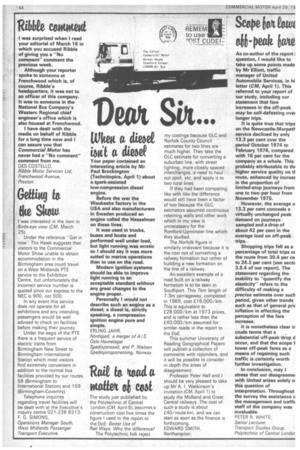Rail tit 'mai a wan of cot
Page 46

If you've noticed an error in this article please click here to report it so we can fix it.
The study just published by the Polytechnic of Central London (CM, April 8), assumes a construction cost five times the figure I used in the report to the DoE: Better Use of Rail Ways. Why the difference? The Polytechnic folk reject my costings because GLC and Norfolk County Council estimates for two lines are much higher. They take the GLC estimate for converting a suburban line, with street lighting, more closely spaced interchanges, a need to haul out spoil, etc, and apply it to two rural lines.
If they had been comparing like with like the difference would still have been a factor of two because the GLC estimators assumed continuous retaining walls and other work which in my view is unnecessary for the Romford-Upminster line which they studied.
The Norfolk figure is similarly irrelevant because it is the cost not of converting a railway formation but rather of building a new formation on the line of a railway.
An excellent example of a road built on a railway formation is to be seen in Southport. This 7km length of 7.3m carriageway, completed in 1969, cost £16,000/km. This is equivalent to £28,000/km at 1973 prices, and is rather less than the £.40,000/km assumed for similar roads in the report to the DoE.
This summer University of Reading Geographical Papers will publish a collection of comments with rejoinders, and it will be possible to consider in depth the areas of disagreement.
Professor Peter Hall and I should be very pleased to take up Mr A. I. Watkinson's. invitation (CM, April 1) to study the Midland and Great Central railways. The cost of such a study is about £40/route-km, and we can start as soon as the finance is forthcoming.
EDWARD SMITH, Northampton.




















































































































































































